Begum Shamsun Nahar
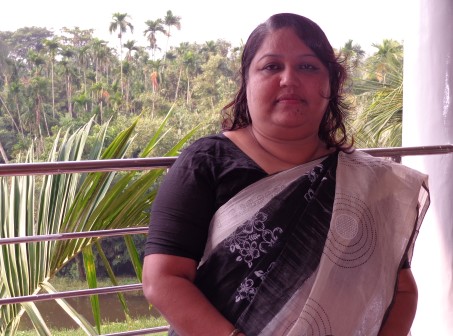
Begum Shamsun Nahar is a freelance Consultant currently working as a Social Development and Gender Specialist at Flood and Riverbank Erosion Risk Management Investment Programme, Participatory Small Scale Water Resources Sector Project and Preparation of Sanitation, Drainage, Improvement Strategy and Master Plan for the city of Chittagong for the Government of Bangladesh.
Begum is a lifetime member of Bangladesh Water Partnership (BWP), the Coordinator and a Founder Member of Bangladesh Women and Water Network (BWWN) and Gender and Water Alliance (GWA) and the Chairperson of Board of Trustee at Coast-Trust.
Begum was born in Laxmipur, a coastal district of Bangladesh and brought-up in Chittagong which is the second largest city of the country. She is holding several degrees; a Master of Social Science, Bachelor of Laws and a Bachelor of Arts from the Chittagong University of Bangladesh and a Post Graduate Diploma in General Management from Denmark.
Begum started her career as Women Development Officer in September 1987 in a Danish International Development Agency (DANIDA) funded rural development project and managed a multi-disciplinary team as the Head of Women Development Unit of Project Advisory Team. This journey has taken her a long way and enable her to establish a good working relationship with the Bangladesh Government, United Nations, other Non-Governmental Organisation (NGOs) and most importantly the grassroots level women.
What would you say are the main challenges in your work as a woman?
- Gain acceptance and recognition as a professional in the society
- Women are having comparatively lesser opportunities in the job market; certain jobs are specifically defined for women while all the other general once for male
- The perception of the community is that women’s involvement in water sector does not go beyond the domestic use of water
- It is very rear to find women at decision making positions in institutional or any other grassroots level organizations who manage water and the professional women hardly get an opportunity to share their views in public
- Shortage of women professionals who are having a diverse knowledge on water sector
What have you done to overcome these obstacles/challenges?
- Begum had to carry out an extraordinary workload and accomplished the expected targets to confirm her superiors that she is equally skilled similarly to a man.
- Competed for different professions without confining herself in female jobs, as a way to encourage other women to do the same
- She always brought the attention of others on the various roles of women in water sector; women as farmers, in animal husbandry and as agriculture labour in addition to managing the household water consumption.
- Trained women in water management and awareness raising of both female and male on the importance of women being in decision making positions.
- Organised trainings on water management for women professionals working in different sectors
Recommendations to other women in similar situations in the water world?
“Networking helps women to build their moral support by learning from each other through knowledge and experience sharing”.
Zakia Naznin
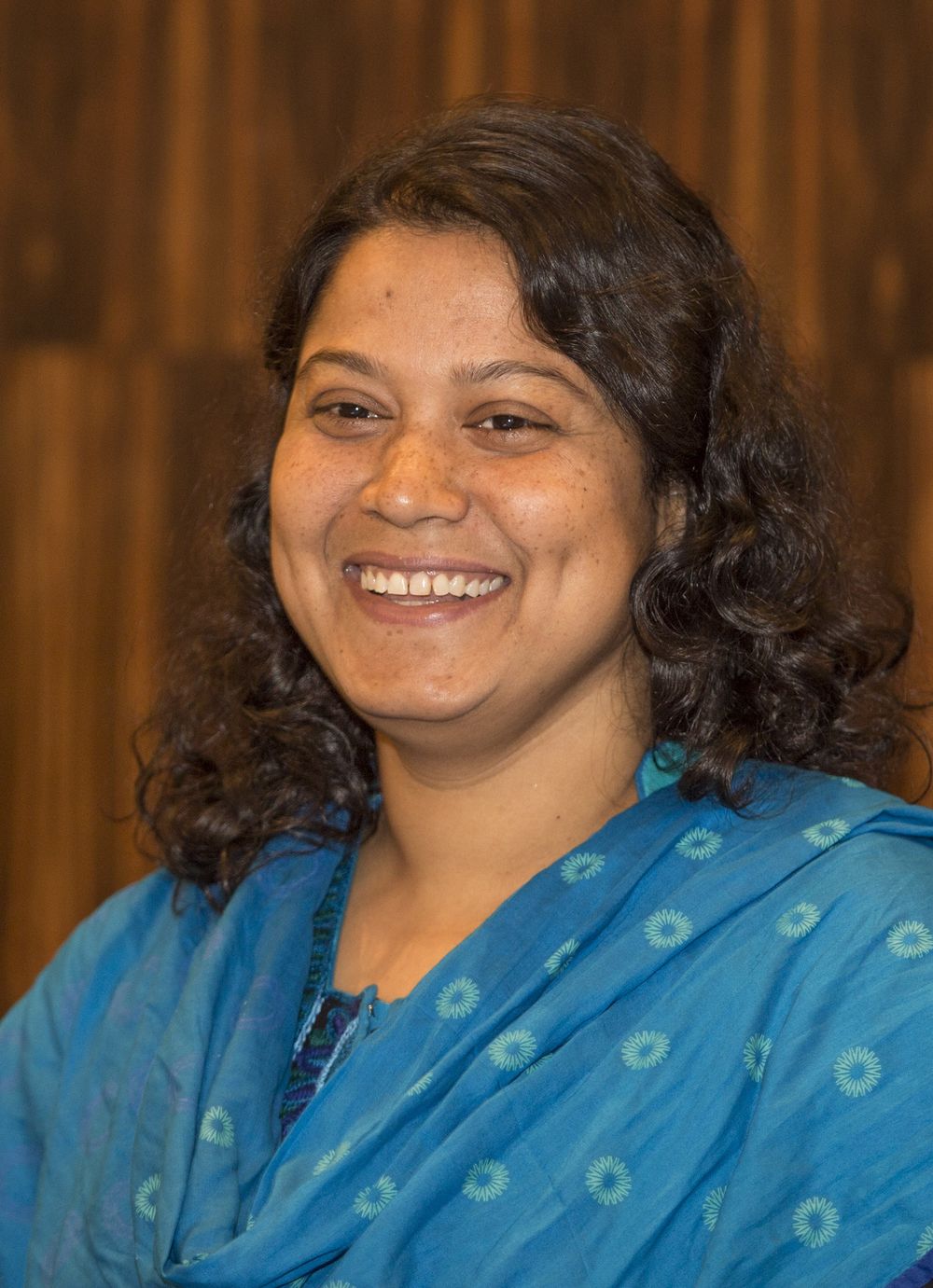
Zakia Naznin is a Researcher working in Bangladesh Centre for Advanced studies (BCAS) since 2014. She has been working in areas of climate change and gender, water and women and violence against women and is one of the founder members of South Asian Feminist Allience (SAFA) and focal person for BCAS for SAFA.
“When I was a child, a woman from my neighborhood was often tortured by her husband which was the actual reason of arising questions related to women’s social position and rights in my mind. That was spontaneous and a strong feeling though unorganised in terms of thought. Besides, my mother’s words ‘be independent, at least in terms of income; create options for yourself so that people can’t take you for granted’ had deeply influenced me to learn more on gender and power relations.”
The first and continuous challenge for me is to deal with my own mind-set developed through growing up in a patriarchal society. The determined values and norms interact silently in analysing and understanding situations and contexts as well as decision making in both personal and professional life.
In workplace, many people prioritise my identity as a woman, of more than a professional. Some express their opinions through their gesture - women are less capable and trying to show-off their superiority. Not always - but sometimes discrimination can be observed between male and female in salary increments and other opportunities, however being equally talented. I feel these challenges can be overcome until the question of leadership position arises - we, the women with very few exceptions are generally allowed to go till midlevel in the hierarchy comfortably but not above that.
As a woman, I consider my own security in office as well as outside the office, as many incidents of sexual harassment are being reported and the security systems are not vigorously practicing in the region. This creates mental stress which often impacts my mobility and therefore my work.
Motherhood became a challenge for me for once and I had to abundant my employment for two years for the wellbeing of my children. I am grateful to my husband and children whose continuous support has given me the courage to get back to work.
I work hard without thinking about the short-term results and I believe if I continue my hard work success will come. My intension is to work dedicatedly and inspire the women and men around – which might assists in changing their perception on women.
My personal experience made me believe that women can make changes in their own lives through realising their rights and having control over resources. It is my personal and professional commitment to facilitate myself and other women for realisation and achievement of Women’s Rights to make positive changes in their position in the family and society. I do believe that I can do that being a women thus am proud of my women identity.
Purnamita Dasgupta
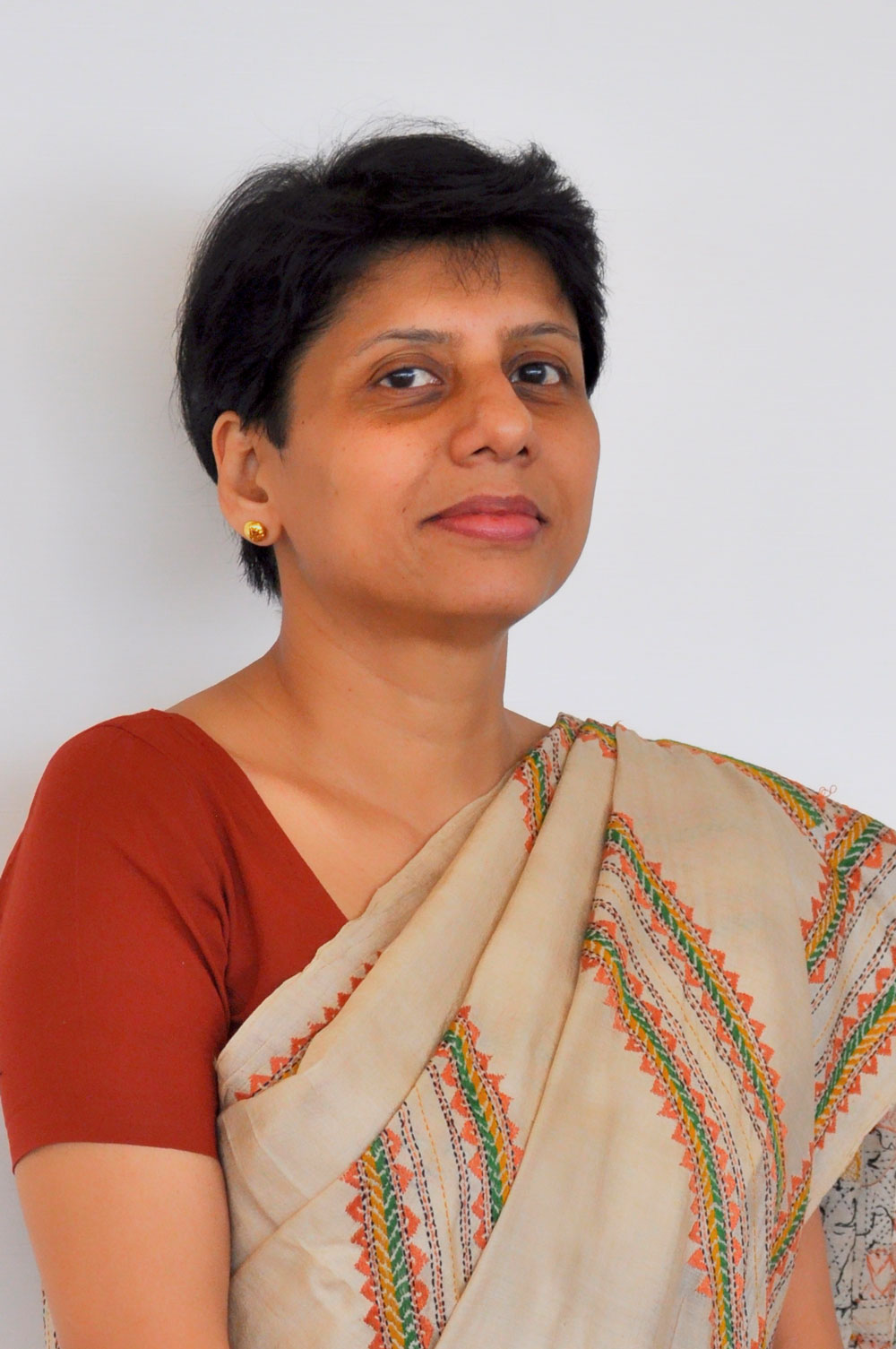
Purnamita Dasgupta is Chair and Acting Head of the Environmental Economics Unit at Institute of Economic Growth, Delhi, India. Her research interests include Environmental and Natural Resource Economics (Primary specialisation), Health Economics and Development Economics. Purnamita has served on several government and non-government committees in various capacities and has been principal investigator on several sponsored projects from both Government and non-Government organisations.
What would you say are the main challenges in your work as a woman?
I started gaining interest in the way the environment was looked at within mainstream narratives and models on economic development, and in particular, in the way it was (or rather was not) being visualised in the policies and programmes as a post graduate student in the 1980s. At this time, the main challenge was in convincing peers and my parents that this was something worth pursuing for my higher studies. Some drawbacks that were pointed out were predictable such as how more lucrative the job market would be if I took up conventional specialisations such as industrial or agricultural economics. What I found far more intriguing was the way some peers revealed their mind sets as far as women were concerned. An almost universally accepted wisdom in those days was that the best trajectory for a woman was to take up a teaching position after her master’s degree, as it would help combine household and family duties with a career. So the most often repeated question from well-meaning peers who wanted to accommodate my interest in having a career in the longer run, was “there is no scope for the environment in any economics department” or “that’s only for environmental science students who are males and can go to the field for long periods, conducting experiments and collecting data.” So, I was being foolish on both counts: the choice of subject and the infeasibility of pursuing it as a woman.
Issues of safety and security for a woman moving around on her own were very much a genuine concern. This was long before mobile phones arrived in India, the internet was virtually non-existent, and the popular “STD” booths were still few and far between in rural India. Options on commuting and the available means of transportation were also much poorer than these are today. It was however equally true that there were no secondary data sources. However, fortunately, there were a handful of senior economists that had started doing “projects” which looked at environmental issues. Funding to pursue one’s research dream and finding a good mentor with whom one could work were the main challenges at the time, because in the environment sector both were scarce resources at the time! Being a woman meant, that even with the best intentions, sometimes people who could act as mentors would think twice about the safety and security concerns related to field visits and encourage one to rather explore all possibilities of working with secondary datasets, or settings close to one’s hometown.
Over time, I have increasingly realised that there are varying levels of discomfort that men experience in the presence of a woman who walks with her head held high, looks you straight in the eye, and seems completely unconscious of her gender while speaking in a professional setting. I have felt this mostly in South Asia. While some men are perfectly at ease, (and thankfully the number is increasing I feel), some will listen out of a sense of respect for the overall context, but will not necessarily engage with you, here you are the exception to the rule and some will simply look uncomfortable, waiting for you to finish. When the latter include the well-educated and professionally established, it can be completely mind boggling and this angers me the most.
Balancing home and the career inevitably emerges as a challenge for most women and I am no stranger to it. Discharging family responsibilities and social obligations in the South Asian context is for the most part deemed to be a woman’s job. I personally have been very fortunate in having an extremely supportive husband. However, even where there are supportive partners, the rest of society and one’s larger family can often tend to measure one’s social worth in terms of how well these responsibilities are fulfilled. It takes time to convince some to change their ways of measuring the worth of a woman, and in some cases, it’s just impossible! Alea iacta est ......the die is cast when you have decided to have a career in this field.
What have you done to overcome these obstacles/challenges?
Looking back, I realise that I was extremely fortunate to have parents who were very encouraging about my pursuing higher studies, and very easy to convince that my passion lay in studying the environment. A couple of renowned teachers, who had known me during my masters at Delhi School of Economics also helped build confidence in me that I could achieve whatever I set out to do. I think I must have consciously sought out their help and counsel while shunning those who had different views among both peers and teachers.
At every subsequent step in my career, I would first ask myself: Is this what I want to do and as of that moment, am I convinced that this is what will make me happy? To a large extent, once this had been figured out in the affirmative, the next step was easy: to make a commitment to work hard, and with complete sincerity to impress upon mentors who could guide and help me that I was worth my stated dream. What really helped me in life, and I do hope that many women are as fortunate as I have been in this regard, were the excellent mentors I had at my place of work.
Dealing with people in the community who had grave concerns, who faced challenges far greater than mine in life, also became an inspiration and helped me in pursuing my career in life. Ultimately, these are the people, the communities that I am answerable to when it comes to the final reckoning – what has my work done for the people on whom I researched, and for whose larger interests I supposedly choose this career path over others.
My family, my husband and son, have been hugely supportive: not in terms of some dramatic incidents, but in terms of our everyday lives. The family has been a space where each of us treats the other fairly and equally and shares the burden of domestic responsibilities. This needs not always be pre-determined either as to how it’s going to work out. It’s something every member of the family needs to work on to achieve.
There are times when family or social responsibilities take precedence over my career. I have always interpreted these as situations where either I have accorded priority to these because it gives me satisfaction, or it gives satisfaction to someone whose happiness I value. Over the years, as I grow older, it has become easier to say “no” to situations where neither of the above two hold.
I have always found that some simple rules, based on my own priorities and value system, can make life easier for me. For instance, I decided not to travel till my son was five years old. I have never hesitated about saying no to assignments and work responsibilities if someone close to me is ill and needs my help. But the crucial thing in such a situation is to acknowledge and genuinely appreciate the inconvenience this may cause to someone else – in my team, at my workplace, and so on. And, not to take advantage, but to try to repair the damage as much as possible. It is also equally true that in the process one may have to give up a job, a promotion or hear statements that can even seem unfair and ill motivated from colleagues. I think what I have learnt in these situations is to filter out those whose comments matter from those whose comments do not matter. It worked best for me not to fret about whether everyone was convinced about how good or bad I am. It is simply irrelevant to me as long as my conscience is clear.
One also has to let go of some things to gain some things. So, to keep the balance between home and career, if need be, it’s more important to pursue the long term dream and say “Oh let it go” to other shorter term goals such as how much money am I making.
Dealing with the extent to which my gender matters to others – well, if I know that there is no reason to suspect a deep seated prejudice or bias against me as a woman, I just work hard (and women with careers do need to work very hard, believe me) and ensure that I am as close to 100 percent as possible in my work, in having relevant knowledge at my fingertips, so that when I speak, people forget my gender. I do not want anyone to grudgingly “grant” me Equality – nor do me a favour. Equality is my birthright. Beyond that, I seek no patronising attitudes, I do not want any favours, and I just want you to recognise me as an individual based on my merit and my competencies.
Recommendations to other women in similar situations (in the water world)?
Be passionate about your dream and let that motivate you to work hard and with full sincerity. If you get de-railed for some reason, de-stress as much as you can. Instead of trying to desperately get back on track, I actually take a couple of days off - read books, listen to music and do anything that can constructively relax myself.
Be practical - there will be situations when you will have to do a job that is not fit in 100 percent with your dream, or re-schedule work for a few days to care for someone – all situations which require one to be flexible. After all, you probably appreciate the necessity of some of these compulsions and derive satisfaction from some celebratory or family occasions, at least as much as your work. It has served some important purpose in your personal life. As for the dream career, you do not have to worry, you will get back, and with luck it is going to be better than before!
Learn to make peace with yourself on all those fronts which apparently create temporary delays in your career progression and which you cannot immediately do much about. This is particularly important when family and social responsibilities come your way. The dream motivates you, the tryst with everyday life strengthens the resolve to pursue it whenever you can.
Tell your well-wishers, even those who have diametrically opposite views from yours, to be happy for your sake, deriving happiness from what makes you happy. To share your happiness truly, they need to measure your happiness in terms of your satisfaction with life, not in terms of what society or a neighbour tells your near and dear ones is the measure of happiness.
“Hey, that’s quite preachy, it’s easier said than done.........but then, I have always been a stubborn Optimist.”
Chanda Gurung Goodrich
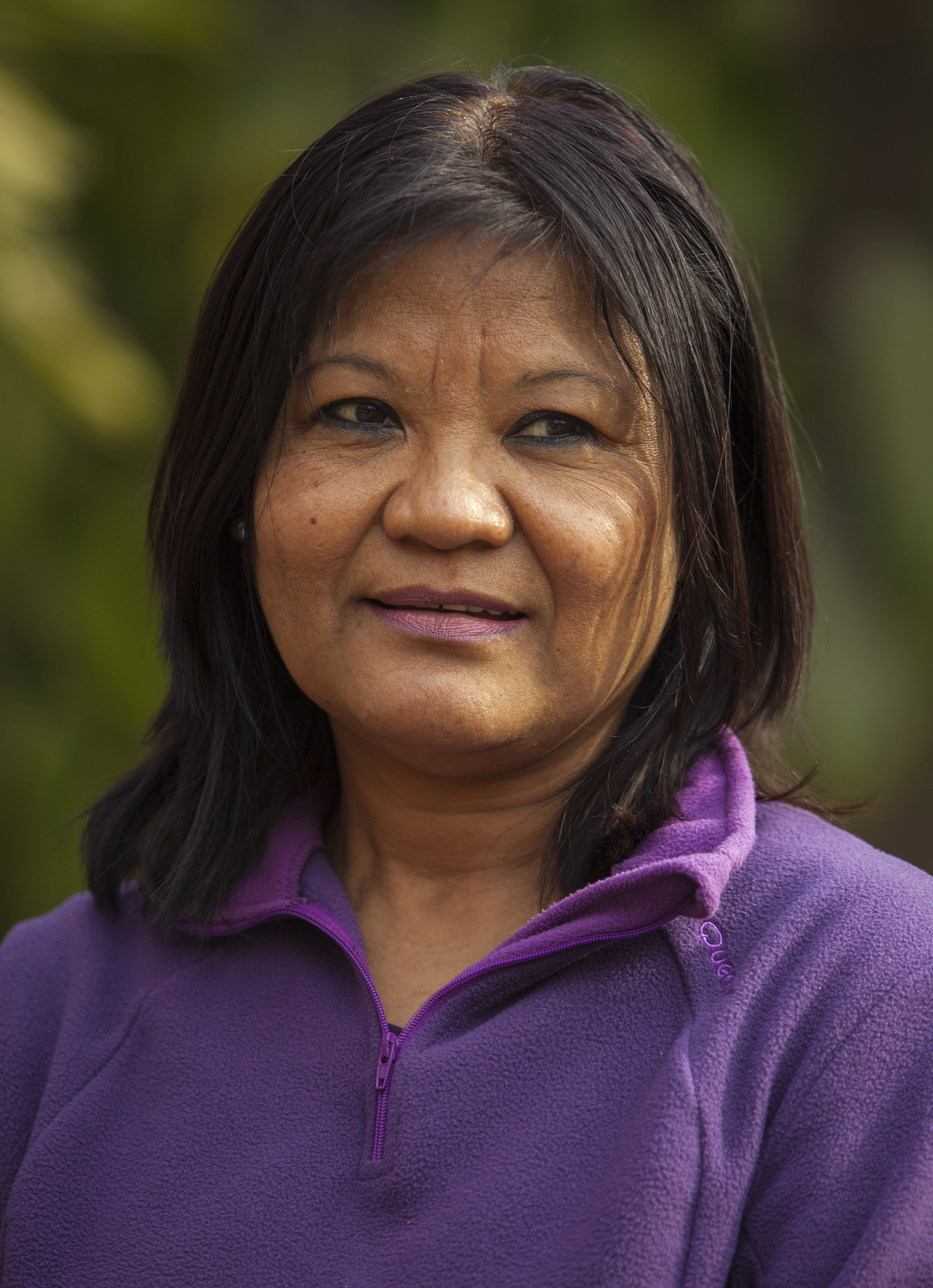
Chanda Gurung Goodrich is the Senior Gender Specialist at the International Centre for Integrated Mountain Development (ICIMOD) since March 2014. Prior to this she has worked in the International Maize and Wheat Improvement Center (CIMMYT), South Asia Regional office, Kathmandu; in SaciWATERs (the South Asia Consortium for Interdisciplinary Water Resources Studies) based in Hyderabad; ICRISAT (International Crop Research Institute for Semi Arid Tropics) Hyderabad, India; and as a gender consultant and researcher for many organisations like the International Research Development Centre (IDRC) ETC Netherlands, Chemonics International, The Mountain Institute, Indo-Swiss Project Sikkim (ISPS)
What would you say are the main challenges in your work as a woman?
As a woman the biggest challenge on the personal front is being a mother. It is quite difficult to juggle the work responsibilities and responsibilities to my son. It aggravates when I have to travel and my husband is away from home. This means compromising with my role as a mother, in particular for guiding my son in his studies and assignments. Most oftenly we were not be able to spend holidays together as a family, as it is difficult to match my leave with my son’s holidays. Also, I had to sacrifice most of my office reception dinners as I need to be with him for his studies and cannot leave him alone at home. Again, because I am a woman, it is still left upon me to supervise the home and my son. Although my husband is supportive, somehow this role just falls on me – or maybe I take it upon myself? Anyway, this means that amid all the dilemma and stretch of balancing the job and home/family responsibilities, I hardly get time to follow my passion.
When considering the work front; particularly when working as a gender specialist we meet a lot of passive resistance which is so difficult to counter effectively. The other challenge is that since I am a gender specialist, it is my responsibility to point out and “push’ issues related to gender – however, if you continue to do it, it will resented, and if you do not, it will be taken as that I am not doing my job!
In addition, most people do now acknowledge my specialities as a social scientist who has worked in the field of agriculture, water, natural resource management and food security. They think being a female gender specialist I am only good at “gender studies”.
One of the most unfortunate challenges that women are subject to and undergo at work is despite her qualifications, skills, talent, hard work and performance, is to be overlooked and low rated in comparison to the male colleagues.
What have you done to overcome these obstacles/challenges?
We women get pretty innovative and resourceful to manage things at home. When I go to the field I get the help of my extended family to look after my son. Thank God for our family support and strong ties! What would we women do without them?
I go only for essential work-related travels; this may be a bit counter-productive professionally in some cases, but I have chosen my priority by not compromising on my son’s future. I consider the offices, bosses and colleagues should be sensitive about the women’s role as a mother, which is all about the gender sensitivity - still if they may not but I will still not alter my priority.
On the work front, since I love my job, it is not only a job for me, but my personal commitment and passion. So I just do my job to the best of my abilities.
Also over time, I have learnt to be more assertive. As I said earlier, as a gender specialist you run on a thin line – if you raise your voice too much you are accused of being aggressive and branded as “one of those gender people”, and if you keep quiet you are either not doing your job or they walk all over you!
With experience I have realized that as a gender person you need to be strategic. If I push too much, the staff will either resent ‘gender’ or resent me and put up a wall of resistance, either way this defeats the whole target. Therefore I try to be more strategic and just push “that much”.
Recommendations to other women in similar situations (in the water world)?
Not a recommendation as every woman can make her own strategies and choose her own way. However, what I would certainly say is; identify your own personal priorities and act upon them. There is no wrong or right here and no one can judge you - it is your life and you need to decide and make choices. Be assertive, don’t let people walk all over you. Support each other, listen to each other - this goes a long way in expanding the possibilities of each other.
Let us be role models to the younger generation who would like to follow this path. We need to show them that we women can be as good or if not better leaders in office, without acting like men and without losing our femininity and at the same time without being “feminists”.
Mandira Singh Shrestha
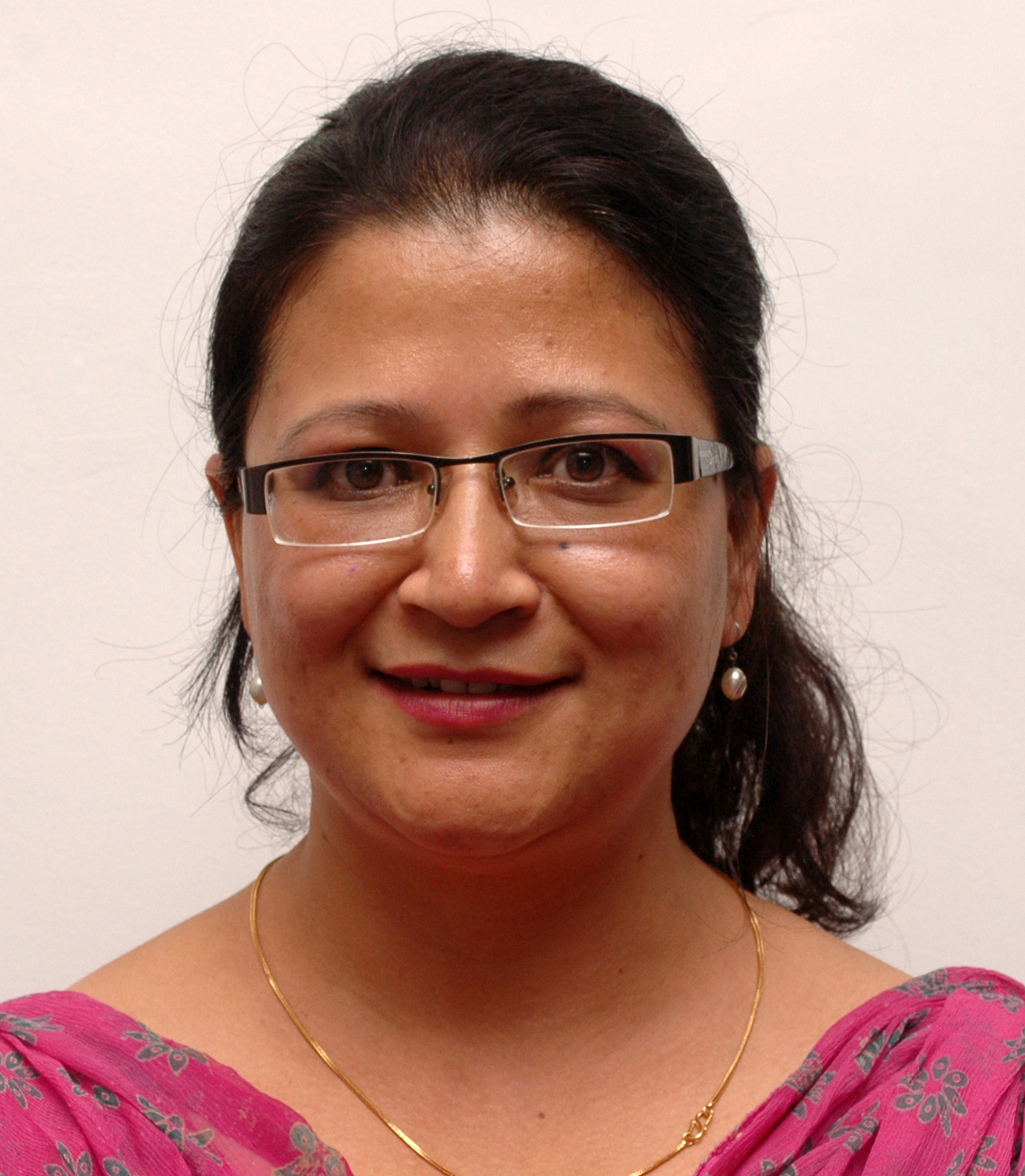
Mandira Singh Shrestha, from Kathmandu, Nepal, is a Civil Engineer with specialization in hydrology and hydraulics. Mandira holds a Doctor of Engineering from the University of Kyoto, Japan and a Masters in Civil Engineering from the University of Washington, Seattle, USA. She has 20 years of research and consulting activities that cover broad areas of disaster risk reduction and water resources management. Her research interests center on application of satellite rainfall estimates for flood forecasting and monitoring. Since 2001, she has been coordinating various regional programmes on early warning systems and transboundary flood disaster reduction.
What would you say are the main challenges in your work as a woman?
The area of work on water weather and climate, dealing with minimizing the impacts of hydrometeorological disasters is quite technical in nature. There is underrepresentation of women in this area of expertise with still fewer number of women which may be due to the scientific and technical nature of the work. There are many instances where women in science and technology are not taken seriously as compared to male colleagues and often their performance are undermined and not listened to. This creates a challenging environment for women at her workplace and have to work harder to be heard to prove herself.
Building your own capacity and skills is important to garner the trust and goodwill of colleagues in your workplace. Apart from the formal education it is important to continue building your expertise and skills through training.
Often there are travels required at work for which support from your husband and family members is a must. I live with my mother in-law and that provides me the flexibility to travel abroad as she takes care of the home and children while I am away.
While I was a student studying civil engineering I was the only female amongst 120 students. Since then, over the last two decades or more, things have changed for the better with more women taking up engineering and areas of technical specialization, but there is yet a lot more to be achieved.
In February 2015 when I visited West Champaran in Bihar, I found that many girls are still not enrolled in schools and are deprived of formal education because they are needed for the household work and in the fields while the men are away. This situation is true in many other rural areas. Opportunity for education to the girl children, awareness building of family members, livelihood options could be example of ways to make things change on the ground.
What have you done to overcome these obstacles/challenges?
I have worked with younger women and provided mentoring to encourage them in technical areas of specialization, such as hydrology and meteorology. Contributed towards building their capacity, interest and confidence. I have made efforts to remove the myth of engineering being only for men but also can be equally taken up by women.
I have made efforts to look at work with a gender perspective, for example looking at early warning systems with a gender perspective. It was challenging to convince the technical partners dealing with weather water and climate to look at the services and the outreach with a gender perspective. I was questioned by technical experts “what has monitoring systems to do with gender”? This prompted me to work with my colleagues to conduct a study on Early Warning Systems with a gender perspective, and also look at ways to mainstream gender issues for which I eventually got the support from the partners.
Increasing the participation of women in meetings, workshops and trainings have been another area of challenge. Working with the partners, raising their awareness and including having in place policy for gender equality which includes criteria for participation which my organization, ICIMOD, has in place have increased the numbers of female participation.
Recommendations to other women in similar situations (in the water world)?
- To be a successful professional woman - a lot of patience, courage and confidence is required. You have to be persistent to get your voice heard and messages across.
- Improving your skills and excelling in what you do with hard work can also gain the respect and attention that is needed to move forward.
- You need to balance your professional life with your family life. Support from your family is an important element that leads to a women being successful in her professional career.
Also trust and good will of colleagues and a conducive environment at home and
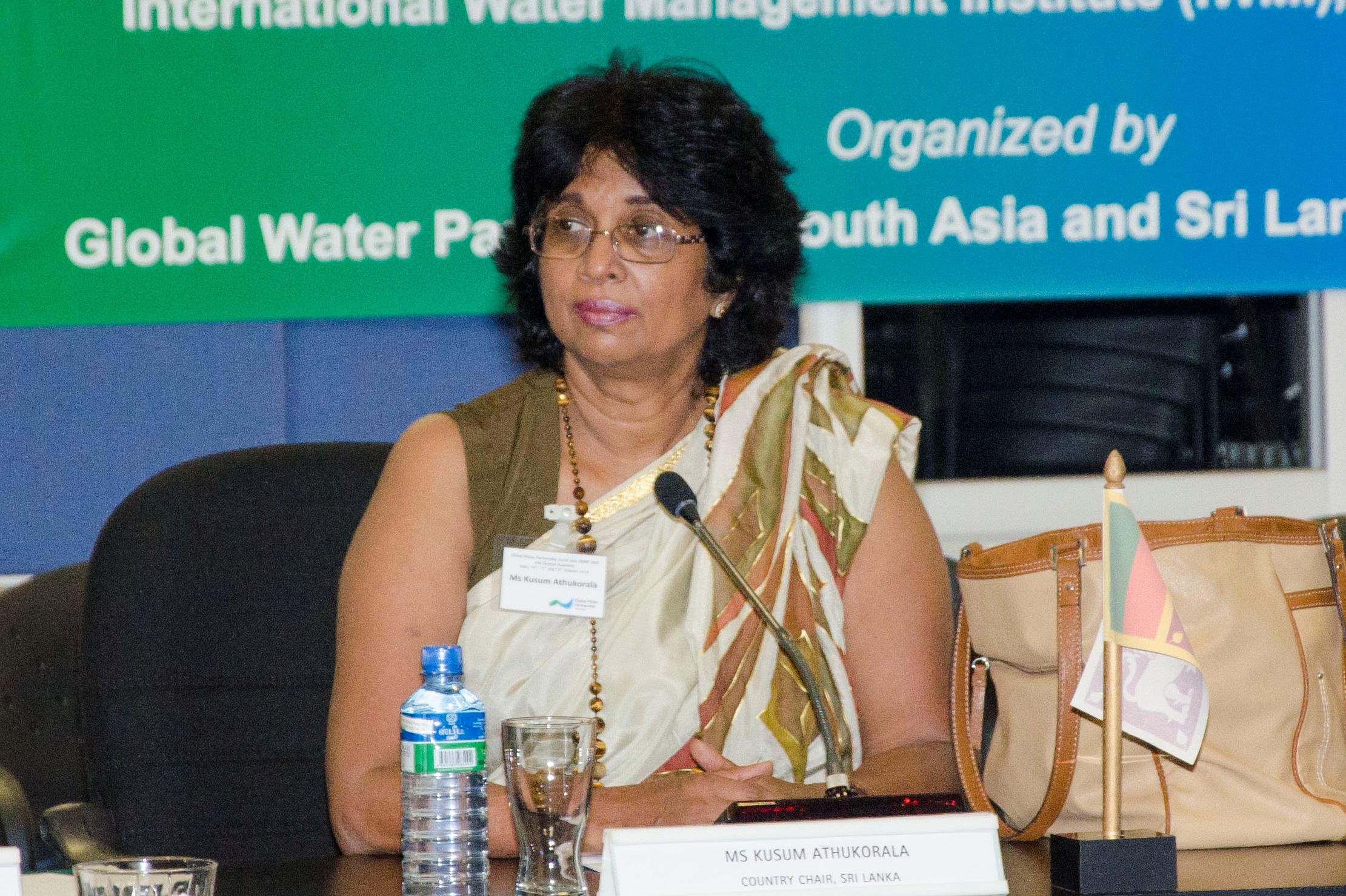
Talking about women and water within GWP it is difficult not to mention Kusum Athukorala as she has been in the forefront of promoting gender issues within the organisation from the very inception that she was inducted to the global steering committee in 1996. Kusum a former University Lecturer later turned researcher, consultant and activist, had been a pioneer researcher in gender and irrigation in Sri Lanka in the 90’s working with International Water Management Institute (IWMI), a field of interest that she revisits continuously through her later advocacy and awareness programmes.
In 1996 her paper on ‘Gender and Water in Sri Lanka’ was among the earliest references of the issue in the Stockholm Water Week. As a member of the first GWP Steering Committee she was instrumental in promoting the principle of equity of representation for men and women in GWP statutes. Since then, she has held positions of Chair, Sri Lanka Water Partnership (SLWP) and Member of Regional Council South Asia, again ensuring that female representation is a must in all GWP activities.
She is also the Founder Chair of NetWwater, (Network of Women Water Professionals), a GWP partner organisation which was set up in 1999 in order to promote female representation to the newly formulated GWP South Asia.
She worked extensively in promoting women in the South Asian water sector with a special interest on capacity building for young women water professionals. She was also a Founder /Core Group Member for SaciWATERS (South Asia Consortium for Interdisciplinary Water Studies) and Theme Leader Advocacy for its ‘Crossing Boundaries’ project which supported postgraduate studies in Integrated Water Resources Management. NetWwater is one of the four Founder members of the Women for Water Partnership (WFWP) and Kusum as long term Steering Committee member played a key role in establishing WFWP as a global player.
She has been involved in numerous global activities as Co-Chair for UNESCO Gender expert panel, had played a significant role in all the World Water Fora and in Stockholm Water Symposium and was invited to address the UN General Assembly on World Water Day (in year). More recognition came through the awards of International Woman in Water award of the International Water Association and the Zonta Woman of Achievement for Environment.
Kusum engages in water activities at local, regional and global level and adept in coalition building. She engages in promoting IWRM through building stakeholder linkages among state agencies, universities, private sector and civil society. Diverse interests and skills are being used to promote water advocacy producing street dramas and documentaries.
Well recognised for her work within Sri Lanka, she has been appointed as a Trustee of the Community Water Trust of the Ministry of Water Supply and Drainage, member of the Advisory Council of the Depart of Coast Conservation and a member of the WATSAN Advisory Council in Sri Lanka.
Promoting diversity and inclusion for social justice within the water sector continues to be the major focus of her work. The major challenge Kusum has faced is struggle to combat polarisation within the sector and the solution is ‘the Triple A approach’ advocated by NetWwater -first to build awareness about the issue or challenge, next leading to advocacy coalition with the expectation of actions.
She introduced activities within Sri Lanka for advocating gender and water, sustainable school sanitation, promoting climate smart agriculture for women leaders in the community water sector and menstrual hygiene management.
Kusum concluded her discussion with the given advice to other women in the sector “Gender activism is like a guerrilla battle, so stay focused and stay committed. Solutions will come in the end through networking with likeminded persons and what we should invest is resources and persistence. However with the formulation of the Sustainable Development Goals, the world has the best opportunity ever to push women and water agenda. “Her hope is that there will be an International Women and Water day soon!